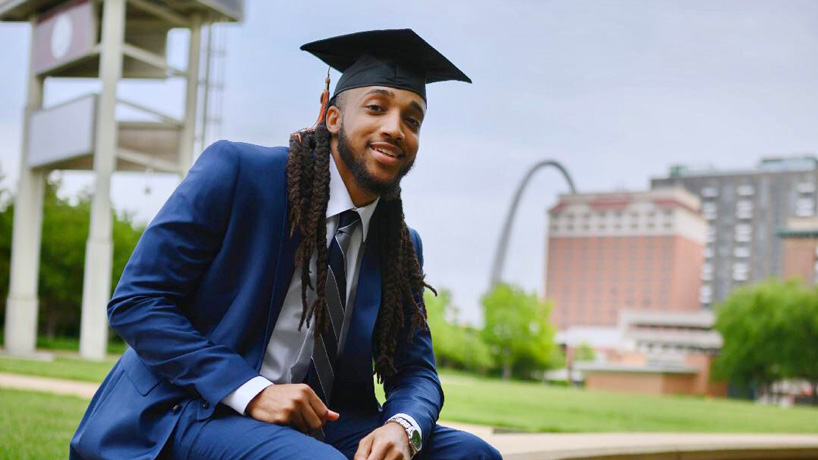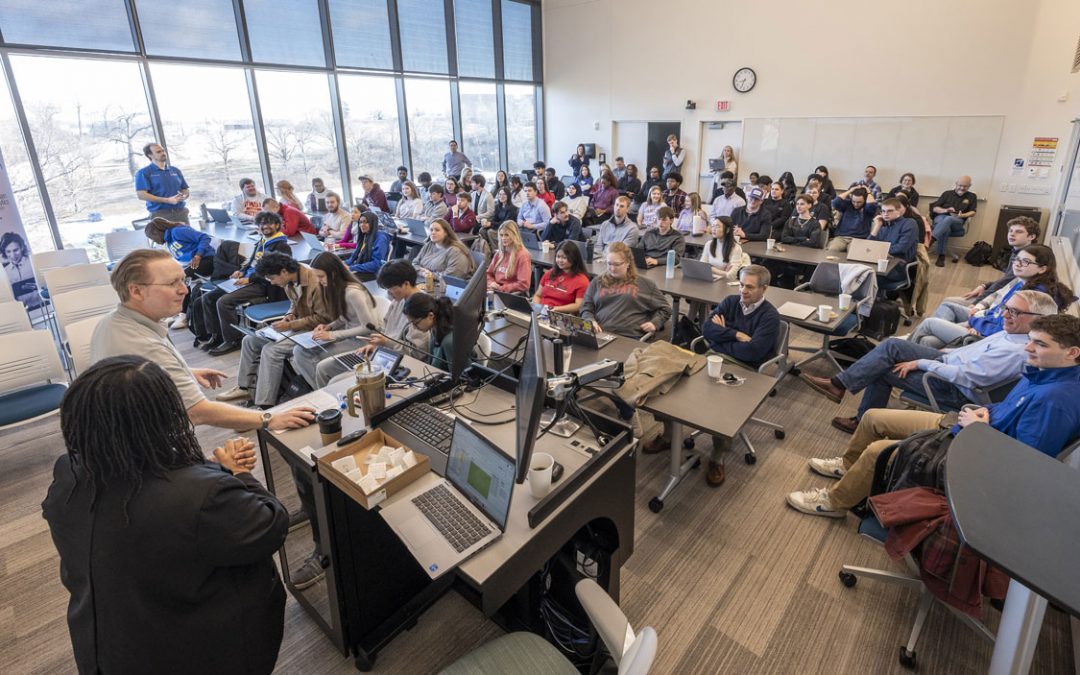
Terran Hill found support and friendship in UMSL’s close-knit Department of Economics, and the knowledge he gained helped prepare him to reach his next goal: law school. (Photo by Drew Donovan)
Terran Hill isn’t sure yet if he’ll be heading east or west come August.
The new University of Missouri–St. Louis graduate is still weighing prestigious law school acceptances from Cornell University and the University of California, Berkeley, after earning his bachelor’s degree in economics, and he’s on the wait list at Stanford University.
Whether he ends up moving to Ithaca, New York or the Bay Area in California, Hill will be taking a huge step toward his ultimate dream of becoming a judge.
“Not enough people of color are deciding the fates of people of color,” Hill said. “There’s still a disparity in sentencing. There needs to be more representation of minorities on the bench.”
Hill grew up in Florissant, Missouri, and was a student at Hazelwood Central High School in 2014 when the shooting of Michael Brown in nearby Ferguson served as a flashpoint for civil unrest over the issue of police brutality. But investigations in the aftermath also highlighted racial disparities throughout the criminal justice system, including in sentencing.
Those were issues on his mind in 2016 when he earned his high school diploma, but a bigger focus when choosing a college was something else: football.
Hill, a high school quarterback, received an offer to play wide receiver at Robert Morris University Illinois. He wound up spending two years as part of the NAIA program in Chicago.
It was an injury that prompted his move to UMSL. He could have probably rehabbed and continued to play, but he decided to take it as an opportunity to put his full attention toward school.
“Since I wasn’t playing football, I decided to stay closer to home,” Hill said. “Obviously, I’m from St. Louis. UMSL is one of the best schools at the best prices, so I ended up applying.”
Always a strong student from his days in high school, he transferred into the College of Business Administration, but he wasn’t certain he wanted to stay there.
In his first semester, he took Principles of Microeconomics with Professor David Rose and immediately liked the subject matter. He had also mulled switching to English, math or philosophy, but he found economics to be right at the intersection of his interests.
It didn’t hurt that he’d seen it on several lists of the top majors for pre-law students.
“It combined literally everything I like into one major,” Hill said. “You get some math, a little bit of philosophy, a bit of history, a little bit of everything.”
He had no idea how impactful that decision would be on his UMSL experience beyond the classroom.
Hill found a camaraderie among students in the Department of Economics, who often hung out and worked through problems together in the Sharon G. Levin Economics Resource Center on the fourth floor of the Social Sciences and Business Building.
“One of the things they emphasize is collaborative learning, learning with your peers,” Hill said. “They always write on the board that it is not a quiet lab, so people coming in won’t get upset because you come into a computer lab and there’s people talking. They host events there. They host speakers. I met a lot of people there.”
Hill was just as grateful for the faculty members he learned from and got to know over the past two years, from Rose and Professor and Chair Anne Winkler to Professor Lea-Rachel Kosnik and Assistant Teaching Professor Brian Speicher, who hosted Hill and some of his classmates for a game night.
Kosnik, who wrote a letter of recommendation for Hill to accompany his law school applications, praised him as a student.
“Terran stood out as a well-rounded thinker who brought a wide-ranging perspective to any topic,” Kosnik said. “He was motivated, curious and always aware of real world policy implications. His term paper in natural resource economics on the Flint Water Crisis, for example, brought a deft eye to an important topic. It was always a pleasure to have Terran in a class.”
Hill missed being in the classroom with his professors in the final two months of the spring semester, and remote learning made already difficult courses like econometrics and geospatial intelligence more challenging.
He met those challenges while not only going to school but also completing a year-long internship that began last summer at the Boeing Intellectual Property Licensing Company. He works in contracts, serving companies who want to license Boeing’s inventions.
Hill was offered the chance to remain with Boeing on a full-time basis, but law school was too good an opportunity to pass up, so he’ll instead remain in his position until July.
The first male in his family to earn a bachelor’s degree, Hill was a little disappointed not to be walking across a stage over the weekend. But he wouldn’t trade his UMSL experience.
“I feel like everyone really cares about each other and likes each other,” Hill said. “Jobs know they’re getting mature people who maybe had to work through undergrad, and they value that.”














